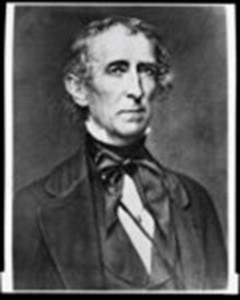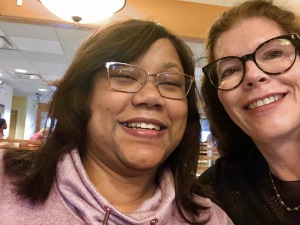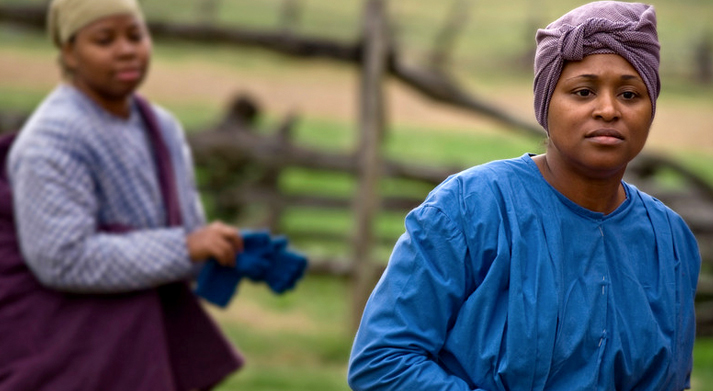 “You owe me what was always mine” is the title of Briayna Cuffie’s latest blog post on reparations4slavery.com. She is speaking to enslavers whose family records, letters, journals, photos, plantation accounts, etc. contain valuable information about the men, women, and children they enslaved.
“You owe me what was always mine” is the title of Briayna Cuffie’s latest blog post on reparations4slavery.com. She is speaking to enslavers whose family records, letters, journals, photos, plantation accounts, etc. contain valuable information about the men, women, and children they enslaved.
Category: Linked Descendants
Remembering Our Enslaver Ancestors: Which Facts Define Them? A Look at the Differing Viewpoints of the Descendants
 In December 2020, Eric Kolenich of the Richmond Times-Dispatch interviewed several descendants of President John Tyler. He was prompted to write about them and their ancestor when John Tyler Community College began to consider changing its name, and his conversations with members of the Tyler family highlight the issue of how descendants of Confederate enslavers choose to regard their ancestor.
In December 2020, Eric Kolenich of the Richmond Times-Dispatch interviewed several descendants of President John Tyler. He was prompted to write about them and their ancestor when John Tyler Community College began to consider changing its name, and his conversations with members of the Tyler family highlight the issue of how descendants of Confederate enslavers choose to regard their ancestor.
What are the salient facts? Tyler stepped into the position of tenth president of the United States for a single term, but later betrayed his country when he was elected to the Confederate Congress in 1862. When he died shortly thereafter, he was buried with a Confederate flag draped across his coffin. Although Tyler led a country founded on the principle of human equality, he was a plantation owner whose wealth was gained from the exploitation of an enslaved workforce. His great-great-granddaughter’s recent research has discovered 46 enslaved people listed in the 1850 census. During his presidential career, Tyler stood up for his own principles and values, and vetoed much legislation. As a result he was thrown out of his political party, was the first president to have a veto overridden, and was the first president to go through an impeachment vote.
The Gwynn’s Island Project Reconnects the Descendants of Black Island Families to their Roots
-

Maria S. Montgomery & Allison Thomas
Maria Montgomery found me on Ancestry.com in 2016. Our family trees overlap because my ancestors enslaved hers. We are “linked descendants”—cousins regardless of whether we share DNA. She asked if I had any probate records that might list people my family enslaved on Gwynn’s Island in Mathews County, Virginia, a five-square-mile triangle of land in the lower Chesapeake Bay.
I sent Maria my third great-grandmother Mary T. Edwards’ Civil War diary that lists 20 enslaved people seized as contraband by the Union Navy in 1863. Maria’s great-great-grandparents, William M. Smith (“Billy”) and Dolly Jones (“Young Dolly”,) are on that list.
Healing Historic Harms Through Research — Sharon Leslie Morgan

Sharon Leslie Morgan moved to Noxubee County, Mississippi to research her ancestors’ history. Morgan’s great-great-grandmother, Betty Warfe Gavin, was enslaved there, and gave birth to 17 children. The father of all of them was Robert Louis Gavin, a white man and the nephew of her enslaver.
“My ancestors came from here and fled,” says Morgan. “For me to come back and reclaim memories, experiences, relationships, I think that is going to help with healing the historical harm of slavery.”
Continue reading “Healing Historic Harms Through Research — Sharon Leslie Morgan”
BitterSweet ReLaunch!
Dear BitterSweet Readers and Writers:
We are pleased to announce the re-launch of BitterSweet: Linked Through Slavery, a blog hosted by the Linked Descendants Working Group and Coming to the Table (CTTT.) Linked descendants have a joint history in slavery–a pairing of a descendant of an enslaved person with a descendant of his or her enslaver, who are researching their shared history and hoping to find people they are linked to through slavery. Some linked descendants have found each other and are in communication, some are still searching.
Cast In Bronze
by Trina Michelle Robinson
I’ve always been fascinated by migration stories. Hearing the details about why a person left the place of their birth to settle somewhere new always satisfied my love of storytelling and origin stories. Perhaps I was pulled into these tales because I was unknowingly trying to fill a void in my own life. Growing up I did not have many stories of my own that had passed down for generations in my family. But once I was able to unlock that door, and discovered the migration stories of my own lineage, I was introduced to a world I had never imagined. The triumphs and brutality, all living together, laid before me. My journey exploring my ancestry has taken me to the archives of libraries and old courthouses throughout the country and as far as the food markets, private beaches and slave prisons in West Africa.
“There was Nothing We Could Do About it”
By Antoinette Broussard

When I was a child, Uncle George’s stories and the serious inflection in his voice always commanded my attention. He frequently told me about my maternal great-grandmother, Violet Craig Turner, who had been enslaved until 1865 by W. P. Wallingford from Platte County, Missouri. Uncle George was my mother’s brother. He always emphasized the middle initial “P” and Platte County in his stories, and that Wallingford fathered eight of Violet’s children, including my grandfather.
My family’s slave history was an injustice, and the person responsible was never held accountable for it. In my late fifties, with the help of a genealogist, I started to look for the Wallingford family.
Unexpected Outbursts
Dedicated to Susan Hutchison, Co-Founder, Coming to the Table
Written by Pam Smith and Ann Neel
Publication facilitated by Prinny Anderson
As all of us in CTTT know, honest communication between blacks and whites has historically been fraught with difficulty. We don’t share the same experiences so we don’t always speak the same language.
There are good reasons for sharing this series of poems written to each other over two decades ago by P(black) and A(white), as we were attempting to communicate honestly and fearlessly about the meaning of race in our entangled family histories. We think these poems are as relevant today as when they were written.
To Honor the Dishonorable
There is a problem I have been wrestling with for many years. One of the refrains I hear over and over among people working for racial reconciliation is the necessity of honoring the ancestors and the insistence that the ancestors are helping us in our work, especially in the unraveling the intricacies of enslavement and its genetic and cultural legacy.
Brattonsville Experience
Story by Quest Whalen, Class of 2019, Tuskegee University, submitted kindness of Dr. Lisa Bratton, Professor, Tuskegee University
Dr. Bratton shared Ms. Whalen’s essay soon after their overnight at Historic Brattonsville on Friday, September 12,



